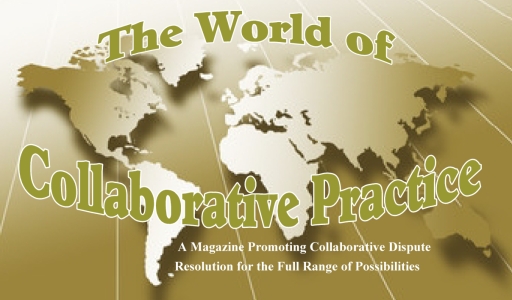
Tags
Related Posts
Share This
The Harvard Principled Negotiation
A Question and Answer session with Florence Gladel, the European pioneer on the subject of “The Harvard Principled Negotiation”.
Avocat Gladel will be presenting on this topic at the Ordre Des Avocats Du Barreau De Paris (Paris Bar Association) on July 6, 2012 in Paris. The workshop is titled “The Harvard Principled Negotiation”
She would be delighted to have you attend and discuss collaborative practice in France.
What is the Harvard Principle Negotiation?
Florence GLADEL:
Roger Fischer and William Ury, two US lawyers and professors at Harvard, are the authors of the seminal book Getting to Yes: Negotiating Agreement Without Giving In. The “principled negotiation” theory which they developed was first applied to the Camp David negotiations between Egypt and Israel in 1978. The “principled negotiation” theory requires a new state of mind with a view to avoiding subjective issues, creating options and considering new solutions if an agreement cannot be reached. The rationale of the “principled negotiation” is to separate relationship issues from the substantive issues and deal with the latter by focusing on interests, not positions; developing options for mutual gain and using independent standards of fairness to avoid a bitter contest of will. The aim of this method is to defend your point of view while safeguarding business relationships.
How is the Harvard Principled Negotiation different from a traditional negotiation?
Although any French avocat can attempt to negotiate any settlement, the parties’ attitude can prevent them from reaching settlements. The avocat’s principal aim is to reach some sort of middle ground between the parties where they are both convinced that their interests have been taken into consideration and they have achieved some level of satisfaction. However, settlement negotiations often turn into an all out “winner takes all war” rather than genuine negotiation with the win-win spirit.
There are no perfect rules. Negotiating is an art that improves with practice and experience. Getting the best result for your client without allowing the self-interests of the individual parties to take hold is paramount when this self-interest can damage the parties’ long-term relationship.
Can this new method be an opportunity for French lawyers?
Even though lawyers can negotiate, some can be reluctant in to use mediation techniques.
Lawyers have difficulty getting into the dispute settlement spirit especially when they refuse to yield ground. Lawyers cannot afford to ignore the techniques proposed in this field, as the principled negotiation method is now part of the syllabus in several university courses and grandes ecoles. Lawyers need to speak the same language as those of their current and future clients. From a practical point of view, if lawyers on both sides have been trained in this method, settlement negotiation should in theory be successful and beneficial to their clients.
Does the main benefit of this method lie in managing parties’ expectations?
Indeed. This is a real thoughtful process. The lawyer will encourage his client to consider his motives. When the lawyers get at the negotiation table, there will be a step-by-step negotiation; for every milestone, a binding agreement will be reached and signed. The lawyer will prepare the case with the client keeping in mind three objectives: get “more”, get “better” and maintain the disputing parties’ relationships. The method has proven its efficiency in general application.
Can you give an example of the benefit of this type of negotiation?
The benefit of this method is best illustrated in a dispute involving an oil refinery located in a US town. In the book Getting to Yes, Fisher, Ury & Patton use this example. The dispute involved local taxes. In a short space of time, local taxes paid by the refinery doubled. The parties’ positions were conflicting. On one side the town needed money and decided to increase its income through local taxation. On the other side, the company refused to pay additional local taxes as an unfair burden. If the parties were to negotiate in a traditional manner, it is likely that the parties will reach a deadlock, and most likely jeopardize their business relationships. Both sides would lose a lot. For instance, the company would drastically reduce its contribution to the social and cultural charities of the town or, alternatively leave the city.
Where can you find shared benefits in this negotiation?
Let us consider the parties’ respective positions. The town cannot afford to lose a steady income arising from local taxes paid by the refinery. Besides, it would be bad precedent if the refinery were to leave the town as it might send the wrong signals to other investors. As far as the company is concerned, it is in its best interest to assist the town in developing its industrial layout and attract other industries like plastics manufacturers allowing the refinery to develop its synergies. Clearly, both parties have a general interest that should serve as the common ground for their negotiation.
How is the Harvard principled negotiation taught?
With this method, one has to prepare at the inception for the negotiation process. The important points have to be prioritized.
When faced with a difficult negotiation, one should learn how to use the 5 main principles:
– Get the big picture (to stand back);
– Creating a positive environment and accepting the other side’s point of view;
– Restating the other side’s position with a view to problem solving;
– Helping the other side to save face and win (to bring success to the other side); and
– If the other side is still reluctant and hopes for a win without having to negotiate, one should demonstrate how much it has to lose if it refuses to negotiate.
This method also allows you to deal with more philosophical queries that are intrinsically tied to negotiations (i.e. Who I am? What is my behaviour when I want to reach an aim? How do people perceive me? Are the company practices based on a win-win philosophy? Does the general strategy of the company underpin the philosophical ethos? How shall I improve my personal impact on the environment?)
The method through which the negotiations are prepared and conducted is important and has a number of advantages. If done properly, it will offer many advantages which include simple communication between the parties. The working terminology is also fairly simple. Disputes can be settled quickly as well. Settlements are binding. Disputes are settled while keeping in mind all the parties’ interests. The major parts of the syllabus are, for instance, how to get the other party to say yes; to develop your self-control and its dialectic; to get your message across in conflicting circumstances; to master your behaviour and usual strategies while negotiating; decide what you can negotiate and what should be left aside; assess what type of negotiator you have across the table; use an adequate strategy and finally thoroughly prepare for the negotiation in order to get more.
For lawyers, they will have to learn how to get over their initial and often wrong perception of the other parties; how to avoid sterile negotiation; how to use objective data; how to work and develop the parties’ interests, how to efficiently prepare for a negotiation, how to add value, how to get your share of the success, how to manage your stress level, how to express your feelings without being aggressive, how to increase your success rate, how to negotiate when you must get a deal and other similar topics.
In which fields can you use the Harvard Principled negotiation?
The “principled negotiation” will be effective in all fields but will be particularly effective if it is used in the areas of business law and labour law. For example, it will be particularly useful when two companies intend to merge and have to negotiate certain issues with trade unions. Dramatic events such as strikes, suicides and litigation would be averted by limiting the employees’ loss of confidence in the negotiations which is usually a net result of a feeling of exclusion.
This is a major issue for business lawyers. In light of the limited amount of money for justice, the lack of people working in the Courts and the increasing delays and costs in litigation, future lawyers will have to be good negotiators and brilliant strategists. It is highly advisable to be trained in “principled negotiation”. You should not miss such an opportunity if you want to get involved in the business world.
*******
References:
Fischer, Roger and William Ury. Getting to Yes: Negotiating Agreement Without Giving In. 2nd ed. by Bruce Patton. New York: Penguin Books, 1991









Dear Mrs. Gladel, I appreciate your article and although we do not know each other personally I would be very pleased to have a chance to share opinions from a collaborative law application in employment issues through GCLC were we both are members, or directly. Best wishes and much success, Anna Márová
Dear larry
I will be so pleased to be with you next year!!!
let me know!
Best
Floorence
Dear Florence:
A very nice article. The collaborative process is well suited for most employment cases, where it is important to maintain relationships.
We had our 8th Annual Civil Collaborative Law Training in Dallas last week. A lawyer from Pargue, Czech Republic attended. It would be wonderful if you could join us next year.
Best wishes,
Larry